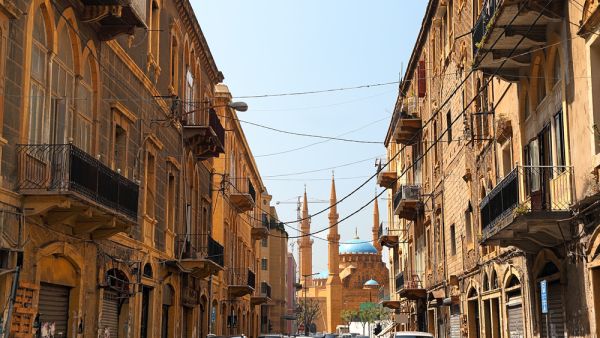For foreigners only. These words, read on an apartment ad in Gemmayzeh, have sparked outrage among a number of young Lebanese looking for a place to rent.
One of them is Linda T., a 33-year-old journalist; she believes that landlords are increasing rent prices for foreigners, which is then biting Lebanese renters wishing to stay in the same areas.
“Foreigners come here for a short period of time and they think that it’s normal to pay $1,500 a month for an unfurnished two bedroom apartment. But it’s not, and it’s making it a lot harder for the rest of us to find affordable accommodation,” Linda says in an interview.
Back in 2003, when she rented her first studio apartment in Hamra, it cost her $325 per month. Today, searching for the same type of flat in Gemmayzeh, Geitawi or Mar Mikhael, she is struggling to find something for less than $800.
“This is not Beverley Hills or New York City. This is Lebanon and I don’t think an average earning person can afford these prices,” Linda says.
She’s addressing a problem that many other Lebanese people in Beirut are complaining about on various rental groups on social media platforms; the city is becoming unaffordable for locals.
According to studies, landlords, NGO’s and professors, it’s a patchwork of problems, in different housing sectors of society, - gentrification, development in rental prices bolting development in salaries, Western foreigners outbidding Lebanese in the most expensive areas, landlords taking advantage of Syrian refugees at the expense of poor Lebanese on in low-income areas, Solidere and a lack of political regulations.
It’s not only a problem faced by Lebanese people trying to rent a roof over their head in the trendy areas such as Hamra, downtown or Mar Mikhael. It’s also a problem for low-income locals searching for rooms in very affordable units.
{"preview_thumbnail":"https://cdn.flowplayer.com/6684a05f-6468-4ecd-87d5-a748773282a3/i/v-i-8…","video_id":"8920a085-1e78-4294-aae3-6a2b8c684fb3","player_id":"8ca46225-42a2-4245-9c20-7850ae937431","provider":"flowplayer","video":"Hong Kong Couple Allegedly Beaten by Police in Subway Goes Viral (Video)"}
Public Works, a research and design studio that deals with a number of urban issues in Lebanon, is aware of the problems. Some landlords are taking advantage of different foreign tenants but the issue needs to be tackled within the context of a lack of regulations for adequate and affordable housing, Nadine Bekdache, co-founder and co-director at Public Works said.
In its publication “Think Housing” from 2019, the research studio documents that rent prices have been accelerating at a much higher rate than the increase in real income for most residents in greater Beirut. Today, the average monthly income in Lebanon is less than $1,500.
From the reconstruction of the city’s downtown to the various residential neighborhoods - Beirut is facing gentrification, according to a public statement from last year from Lebanese American University’s School of Architecture and Design. While gentrification - broadly defined as the process of urban renewability whereby affluent people and businesses move into historical and authentic working-class areas, such as Mar Mikhael - typically leads to higher prices and standards of living, it often brings with it unintended consequences of economic displacement.
This development happens in capitals all over the world. But “unlike many other cities, the lack of basic building regulations and rule of law in Lebanon have made Beirut vulnerable to unusually rapid and uncontrolled transformations of neighborhoods,” the statement say.
An evidence of the kind of well-off foreigners moving in to the trendy areas of Beirut is EuroCost International’s rankings. In 2018, based on expat living costs such as housing rents, Beirut was the seventh most expensive city in the world, pricier than any other places in the Middle East and metropolises such as London, New York and Copenhagen.
A landlord with 15 different properties located mainly in Gemmayzeh, Mar Mikhael, Geitawi, Karm al-Zaitoun and Fassouh said, that he is renting out to foreigners because they can pay, not because he is taking advantage of them.
“A few years ago I would take $350 for a room in Geitawi. Now, it’s closer to $500. But it’s due to the market; there is nothing I can do about. But yes, I predominantly rent out to foreigners who stay short periods,” he says.
He wishes to stay anonymous because of different business partners and arrangements.
At the same time, Lebanon’s property market is facing a crisis. Prices, demand and construction work activity are declining. By the end of last year, an estimated 3,600 unsold apartments existed in Beirut alone, Guillaume Boudisseau, an expert at the Ramco real estate consultancy firm, said.
Mona Fawaz, professor of urban studies and planning at the American University of Beirut, is following the property and rental markets of Lebanon’s capital closely. She believes that the market in Beirut is very segmented, which means that apartments for the rich are being oversupplied, for example, while more affordable apartments are undersupplied. “Solidere drove prices up with hits speculative strategies for decades. Yet the general trend over the past 15 years was first for a spike and then a dive in rental prices,” Fawaz says.
According to her, the overall number of Western foreigners in the country is too small to affect the rental market substantially. However, there are a few exceptions.
“In some areas, or rather a few buildings or blocks, there has been an increase in demand connected to the relief agencies’ employees and perhaps a few more Western foreigners. This could have increased the prices in these special and small pockets.”
More clearly, she sees how landlords coldly taking advantage of desperate Syrian refugees, has affected prices on the rental market in very low-income neighborhoods such as Nabaa. In these areas, Fawaz has documented how Lebanese landlords evicted Lebanese families to rent out to Syrians from whom they could extract higher rents.
“In very affordable units, the prices increased in the beginning of the refugee crisis, but then they dipped as refugees exhausted their savings, found no work and found it increasingly difficult to pay the rent. Now, prices have stabilized,” Fawaz says, speaking of prices outside Beirut’s center of gentrification.
From the perspective of Linda T., the journalist looking for a place in this expensive center, things have not calmed down. She feels that rents are running loose and she refuses to pay the price demanded by the landlords.
“People seem to be giving up, and are settling for those prices; but we shouldn’t. Lebanese and foreigners alike shouldn’t. I would rather bargain and wait a little longer until I find something reasonably priced instead of spending half my salary on rent,” Linda says.
This article has been adapted from its original source.







